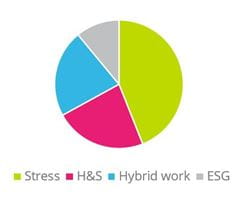With all the changes to the world of work that we have recently experienced and are continuing to experience, our webinar programme this year is focused on the future of work and in particular the hot topics HR teams are having to handle now in order to future proof their organisations.
Our latest seminar focused on whistleblowing and, in particular, how approaches to whistleblowing have changed as a result of the pandemic. The key takeaway points are set out below:
Is whistleblowing becoming a hotter topic?
- There is increasing public support for calling out wrongdoing on a global scale, as demonstrated by the #MeToo movement, Black Lives Matter and Climate Change activists.
- This is reflected within the workplace too. In 2020, Protect reported a 20% increase in whistleblowers seeking advice.
- The pandemic has brought with it an increased awareness of safety within workplaces, compliance with legal restrictions and potential abuse of government support funds which has amplified focus on whistleblowing.
- With ESG and EDI practices coming under increasing scrutiny, this trend is set to continue.
- What makes a “protected” disclosure?
- There must be a qualifying disclosure, being a disclosure of information in relation to one of the specified areas set down in the legislation. These include disclosures relating to a criminal offence, breach of legal obligations, danger to health and safety or environmental damage.
- The disclosure must be made to a specified person, usually the employer but in certain circumstances it can be made to a third party, such as a public body like HMRC.
- The person making the disclosure must believe it is in the public interest.
Confidentiality
- The person making a disclosure may well want their concerns dealt with confidentially and sensitively. This is one reason why a whistleblowing policy setting out how concerns should be raised and giving guidance to managers on how to handle concerns is advisable.
- An employer’s ability to prevent or discourage a person from making a protected disclosure is very limited. In addition, if an employment tribunal claim is brought, the proceedings will usually be in the public domain.
- Individuals who have raised concerns are often keen to know the outcome of any investigation completed by the employer. Whilst it may be appropriate to share some or all of the outcomes, there is no obligation on an employer to do so, and an employer must ensure that it does not disclose any information that amounts to personal data relating to another individual, such as a decision to instigate disciplinary proceedings against another employee.
Potential consequences
- An employee or worker can bring a claim for protection from detriment if they have been put to a disadvantage because of making a protected disclosure.
- An employee may also bring an automatic unfair dismissal claim if they have been dismissed because they made a protected disclosure, for which there is no minimum service requirement.
- An employment tribunal may order interim relief to the whistle-blower in appropriate circumstances.
- In addition, for detriment claims, an award of compensation based on injury to feelings can be made. For automatic unfair dismissal claims, in addition to a basic award, a compensatory award can be made.
Poll results
|
Have you seen an increase in the number of whistleblowing concerns?  |
Have you received any complaints relating to these topics?
|
|
Do you have a whistleblowing policy? |
|
Disclaimer
This information is for general information purposes only and does not constitute legal advice. It is recommended that specific professional advice is sought before acting on any of the information given. Please contact us for specific advice on your circumstances. © Shoosmiths LLP 2025.


